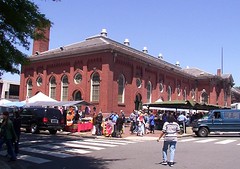Reminder and Agenda of April 5 (DC) Historic Districts Coalition meeting
 Eastern Market. Photo by Dan Malouff. This building is a National Historic Landmark, part of a neighborhood historic district, and the heart of community life for the Greater Capitol Hill neighborhood, a destination-attraction for the region's residents, as well as for tourists--illustrating the multiple benefits that come from historic preservation and asset-based community development.
Eastern Market. Photo by Dan Malouff. This building is a National Historic Landmark, part of a neighborhood historic district, and the heart of community life for the Greater Capitol Hill neighborhood, a destination-attraction for the region's residents, as well as for tourists--illustrating the multiple benefits that come from historic preservation and asset-based community development.(Alas, I am scheduled to be out of town for this meeting. If someone goes and would be willing to write a short report, I'd be grateful.)
Nancy Metzger writes:
WEDNESDAY, APRIL 5 6:30 PM
Board Room -- National Trust for Historic Preservation
1785 Massachusetts Avenue, NW
(Dupont Circle Metro Stop)
AGENDA
1. Welcome
2. Status update on amendments to Historic Preservation Act:
- Tersh Boasberg, Chair, Historic Preservation Review Board
3. Announcements from Historic Preservation Office
- David Maloney, Acting Director
- Also information about National Alliance of Preservation Commisions Forum in Baltimore in July 2006 -- Toni Cherry, HP Inspector
4. Update on Comprehensive Plan Process and timetable for community comments
- Ann Hughes Hargrove, Charles Robertson and others
5. Looking to the Future: A Stronger Voice for Historic Preservation in City Government
- Lisa Burcham, Chair, Government Affairs Committee, DC Preservation League
* HP/OP Budget Hearing on Friday, April 7 at 1:00 in Council Chambers
* Lobbying effort for additional HP staff position in 2006 Budget
* Mayoral Candidates Forum on Preservation and Planning Issues tentatively scheduled for May 16 at MLK Library
6. Issues, Opportunities and Successes in Historic Preservation
- Brief reports from the neighborhoods to share important information
7. Consideration of Proposed Coalition Activities/Events
* Fundraising Workshop for Neighborhood Organizations
* Possible newsletter
* Summer evening get-together
* Suggestions/topics for future speakers
For more information, please contact Nancy Metzger, or Lois Orr.
______________________________________
"Preservation Frustration" -- a 1974 editorial from the Washington Post
May 23, 1974, p. A22 (After all, "If you don't get it you don't get it.")
Shortly, we fear, a nine-story office, shown in the architects' rendering at left below [not reproduced], will replace the turn-of-the-century townhouses at 1720 to 1730 Massachusetts Avenue N.W., shown at right [not reproduced]. The pictures, we fear, illustrate our urban frustrations, which often lead to de-vitalization rather than re-vitalization of our city.
Because of charming townhouses and mansions like these, the Joint Committee on Landmarks has declared Massachusetts Avenue from 17th Street to Observatory Circle a "Historic District." The Landmarks Committee, the Fine Arts Commission, the local chapter of the American Institute of Architects, "Don't Tear It Down" (a historic preservation organization) and three citizens associations have therefore protested the demolition of the old buildings. But the city has no legal means to enforce the integrity of its historic districts* and the Board of Zoning Appeals has recently refused to hear the preservationists' testimony. (*This changed in 1979.)
The old buildings, it is true, are in bad repair--largely because, unlike other cities, the District of Columbia does not require reasonable upkeep and maintenance of landmark buildings on the part of their owners. The buildings have been vacant for some time because they have been "assembled" by one owner, which has made it impossible for others to buy them individually for use as chanceries, association headquarters or other appropriate purposes. The profit to be derived from a high-rise office building is no doubt greater than from the sale of six small buildings in need of renovation. The city authorities, too, believe there is gain in higher tax returns. But the city will lose in the long run.
And it will lose more than charm. The big office building will bring more cars and require more services. The charm, furthermore, brings tourists and keeps residents and a good many desirable institutions downtown. We wouldn't have to worry quite so much about rehabilitating at least some parts of the center city if we could find a way to keep them habitable in the first place.
Index Keywords: historic-preservation



0 Comments:
Post a Comment
<< Home